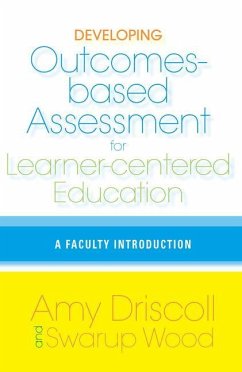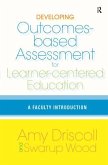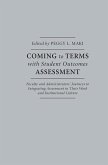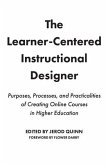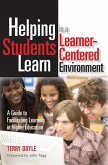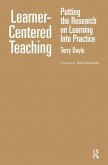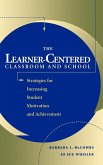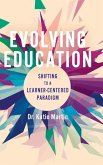Amy Driscoll, Swarup Wood
Developing Outcomes-Based Assessment for Learner-Centered Education
A Faculty Introduction
Amy Driscoll, Swarup Wood
Developing Outcomes-Based Assessment for Learner-Centered Education
A Faculty Introduction
- Broschiertes Buch
- Merkliste
- Auf die Merkliste
- Bewerten Bewerten
- Teilen
- Produkt teilen
- Produkterinnerung
- Produkterinnerung
The authors--a once-skeptical chemistry professor and a director of assessment sensitive to the concerns of her teacher colleagues--use a personal voice to describe the basics of outcomes-based assessment.
Andere Kunden interessierten sich auch für
![Developing Outcomes-Based Assessment for Learner-Centered Education Developing Outcomes-Based Assessment for Learner-Centered Education]() Amy DriscollDeveloping Outcomes-Based Assessment for Learner-Centered Education173,99 €
Amy DriscollDeveloping Outcomes-Based Assessment for Learner-Centered Education173,99 €![Coming to Terms with Student Outcomes Assessment Coming to Terms with Student Outcomes Assessment]() Coming to Terms with Student Outcomes Assessment183,99 €
Coming to Terms with Student Outcomes Assessment183,99 €![The Learner-Centered Instructional Designer The Learner-Centered Instructional Designer]() The Learner-Centered Instructional Designer180,99 €
The Learner-Centered Instructional Designer180,99 €![Helping Students Learn in a Learner-Centered Environment Helping Students Learn in a Learner-Centered Environment]() Terry DoyleHelping Students Learn in a Learner-Centered Environment36,99 €
Terry DoyleHelping Students Learn in a Learner-Centered Environment36,99 €![Learner-Centered Teaching Learner-Centered Teaching]() Terry DoyleLearner-Centered Teaching183,99 €
Terry DoyleLearner-Centered Teaching183,99 €![The Learner-Centered Classroom and School The Learner-Centered Classroom and School]() Barbara L McCombsThe Learner-Centered Classroom and School42,99 €
Barbara L McCombsThe Learner-Centered Classroom and School42,99 €![Evolving Education: Shifting to a Learner-Centered Paradigm Evolving Education: Shifting to a Learner-Centered Paradigm]() Katie MartinEvolving Education: Shifting to a Learner-Centered Paradigm30,99 €
Katie MartinEvolving Education: Shifting to a Learner-Centered Paradigm30,99 €-
-
-
The authors--a once-skeptical chemistry professor and a director of assessment sensitive to the concerns of her teacher colleagues--use a personal voice to describe the basics of outcomes-based assessment.
Produktdetails
- Produktdetails
- Verlag: Routledge
- Seitenzahl: 288
- Erscheinungstermin: 4. Juni 2007
- Englisch
- Abmessung: 229mm x 152mm x 16mm
- Gewicht: 421g
- ISBN-13: 9781579221959
- ISBN-10: 1579221955
- Artikelnr.: 22577920
- Herstellerkennzeichnung
- Libri GmbH
- Europaallee 1
- 36244 Bad Hersfeld
- gpsr@libri.de
- Verlag: Routledge
- Seitenzahl: 288
- Erscheinungstermin: 4. Juni 2007
- Englisch
- Abmessung: 229mm x 152mm x 16mm
- Gewicht: 421g
- ISBN-13: 9781579221959
- ISBN-10: 1579221955
- Artikelnr.: 22577920
- Herstellerkennzeichnung
- Libri GmbH
- Europaallee 1
- 36244 Bad Hersfeld
- gpsr@libri.de
Amy Driscoll retired from California State University, Monterey Bay as the founding Director of Teaching, Learning, and Assessment and from Portland State University as Director of Community/University Partnerships. For the last 11 years, she has coordinated and taught in the Assessment Leadership Academy, a year-long program for faculty and administrators, and consulted nationally and internationally. She co-authored Developing Outcomes-based Assessment for Learner-centered Education: A Faculty Introduction with Swarup Wood in 2007. Swarup Wood is Professor of Chemistry and currently serves as Interim Director of General Education and Coordinator of First Year Seminar at California State University Monterey Bay where he has worked since 1997. He co-authored Developing Outcomes-based Assessment for Learner-centered Education: A Faculty Introduction with Amy Driscoll in 2007.
Why Develop Outcomes for Assessment and Learning? Why Not?; 2. A Culture
for Faculty Learning about Outcomes-Based Assessment. Honoring and
Addressing the Realities; 3. Outcomes-Articulating Our Learning
Expectations; 4. Student Evidence. Designing Assignments and Assessments
for Diverse Learners; 5. Criteria and Standards for Assessment. No Longer a
Faculty Secret; 6. Faculty Responses to Development of Outcomes-Based
Assessment Protocols; 7. Going beyond Making Assessment "Public and
Visible"; 8. Alignment. Making Explicit Connections between Teaching
Decisions and Learning Outcomes; 9. Reviewing and Analyzing Student
Evidence. Constructivist Faculty Development; 10. Faculty Responses to
Assessment of Student Evidence; 11. Moving to Outcomes-Based Assessment and
Learner-Centered Education through the Scholarship of Teaching, Learning,
and Assessment; Faculty Teaching Vignette One. Connection, Reflection, and
Assessment. Assessing Learning Outcomes in a Multicultural Conflict
Resolution Course; Faculty Teaching Vignette Two. Graphic Organizers Guide
Students to Achieve Multiple Learning Outcomes. Constructing Meaning in a
Community-Based Watershed Restoration Course; Faculty Teaching Vignette
Three. First-Year Seminar. Orienting Students to Outcomes-Based Education;
Commencement Speech; Assessment Web Site Resource List; Glossary; Annotated
Bibliography; Index.
for Faculty Learning about Outcomes-Based Assessment. Honoring and
Addressing the Realities; 3. Outcomes-Articulating Our Learning
Expectations; 4. Student Evidence. Designing Assignments and Assessments
for Diverse Learners; 5. Criteria and Standards for Assessment. No Longer a
Faculty Secret; 6. Faculty Responses to Development of Outcomes-Based
Assessment Protocols; 7. Going beyond Making Assessment "Public and
Visible"; 8. Alignment. Making Explicit Connections between Teaching
Decisions and Learning Outcomes; 9. Reviewing and Analyzing Student
Evidence. Constructivist Faculty Development; 10. Faculty Responses to
Assessment of Student Evidence; 11. Moving to Outcomes-Based Assessment and
Learner-Centered Education through the Scholarship of Teaching, Learning,
and Assessment; Faculty Teaching Vignette One. Connection, Reflection, and
Assessment. Assessing Learning Outcomes in a Multicultural Conflict
Resolution Course; Faculty Teaching Vignette Two. Graphic Organizers Guide
Students to Achieve Multiple Learning Outcomes. Constructing Meaning in a
Community-Based Watershed Restoration Course; Faculty Teaching Vignette
Three. First-Year Seminar. Orienting Students to Outcomes-Based Education;
Commencement Speech; Assessment Web Site Resource List; Glossary; Annotated
Bibliography; Index.
Why Develop Outcomes for Assessment and Learning? Why Not?; 2. A Culture
for Faculty Learning about Outcomes-Based Assessment. Honoring and
Addressing the Realities; 3. Outcomes-Articulating Our Learning
Expectations; 4. Student Evidence. Designing Assignments and Assessments
for Diverse Learners; 5. Criteria and Standards for Assessment. No Longer a
Faculty Secret; 6. Faculty Responses to Development of Outcomes-Based
Assessment Protocols; 7. Going beyond Making Assessment "Public and
Visible"; 8. Alignment. Making Explicit Connections between Teaching
Decisions and Learning Outcomes; 9. Reviewing and Analyzing Student
Evidence. Constructivist Faculty Development; 10. Faculty Responses to
Assessment of Student Evidence; 11. Moving to Outcomes-Based Assessment and
Learner-Centered Education through the Scholarship of Teaching, Learning,
and Assessment; Faculty Teaching Vignette One. Connection, Reflection, and
Assessment. Assessing Learning Outcomes in a Multicultural Conflict
Resolution Course; Faculty Teaching Vignette Two. Graphic Organizers Guide
Students to Achieve Multiple Learning Outcomes. Constructing Meaning in a
Community-Based Watershed Restoration Course; Faculty Teaching Vignette
Three. First-Year Seminar. Orienting Students to Outcomes-Based Education;
Commencement Speech; Assessment Web Site Resource List; Glossary; Annotated
Bibliography; Index.
for Faculty Learning about Outcomes-Based Assessment. Honoring and
Addressing the Realities; 3. Outcomes-Articulating Our Learning
Expectations; 4. Student Evidence. Designing Assignments and Assessments
for Diverse Learners; 5. Criteria and Standards for Assessment. No Longer a
Faculty Secret; 6. Faculty Responses to Development of Outcomes-Based
Assessment Protocols; 7. Going beyond Making Assessment "Public and
Visible"; 8. Alignment. Making Explicit Connections between Teaching
Decisions and Learning Outcomes; 9. Reviewing and Analyzing Student
Evidence. Constructivist Faculty Development; 10. Faculty Responses to
Assessment of Student Evidence; 11. Moving to Outcomes-Based Assessment and
Learner-Centered Education through the Scholarship of Teaching, Learning,
and Assessment; Faculty Teaching Vignette One. Connection, Reflection, and
Assessment. Assessing Learning Outcomes in a Multicultural Conflict
Resolution Course; Faculty Teaching Vignette Two. Graphic Organizers Guide
Students to Achieve Multiple Learning Outcomes. Constructing Meaning in a
Community-Based Watershed Restoration Course; Faculty Teaching Vignette
Three. First-Year Seminar. Orienting Students to Outcomes-Based Education;
Commencement Speech; Assessment Web Site Resource List; Glossary; Annotated
Bibliography; Index.

